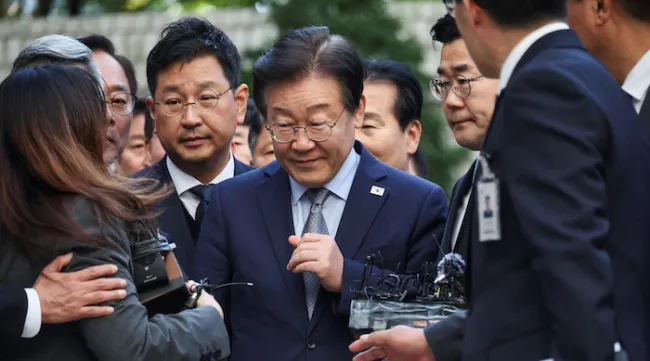Yoon Suk-yeol’s Martial Law Backfires as South Korea Opposition leader Lee Jae-myung Mobilizes Against Dictatorship
On Tuesday night, South Korean President Yoon Suk-yeol stunned the nation with a shocking declaration: martial law. It had been nearly 50 years since such a drastic step was taken, and this move was not only extreme but an outright assault on the democracy South Korea had long championed.
In his televised address, Yoon justified the decision by citing “anti-state forces” and North Korean threats. However, as events unfolded, it quickly became clear that the true crisis was internal—a political meltdown within his own government, spiraling out of control.
The backlash was immediate and massive. Thousands of people flooded the streets outside parliament, furious at Yoon’s decision. Opposition lawmakers swiftly moved to call for a vote to overturn the martial law order. Within hours, Yoon was forced to retreat, acknowledging his defeat and reversing the decision.
What Led to the Rescinding of Martial Law?
Many saw Yoon’s actions as the desperate reaction of a president cornered by political opposition. In his speech, he accused his critics of plotting to overthrow his government and portrayed martial law as a necessary measure to "eliminate anti-state forces."
To consolidate his power, the military was deployed in full force—armed soldiers and police were dispatched to safeguard parliament. Local news outlets even broadcast images of troops entering the building while staff attempted to resist with fire extinguishers.
At 11:00 PM, a decree was issued banning protests and parliamentary activities, placing the media under government control. As expected, the move was met with widespread condemnation. Even members of Yoon’s own party denounced the order as illegal and unconstitutional. His party leader called it “a catastrophic mistake.”
Meanwhile, opposition leader Lee Jae-myung called on the public to gather at parliament and resist Yoon’s authoritarian measures. Thousands responded with chants of “No to martial law!” and “Down with the dictatorship!”
Why Is Martial Law So Dangerous?
Martial law grants the military absolute control during a crisis, when civilian authority is deemed incapable of maintaining order. The last time martial law was declared in South Korea was in 1979, after a coup that ended the reign of dictator Park Chung-hee. Since 1987, South Korea has boasted a stable parliamentary democracy—until Yoon’s fateful decision.
Yoon, notorious for his hardline stance on North Korea, went as far as accusing political opponents of being North Korean sympathizers, despite lacking any evidence. Under martial law, the military receives sweeping powers, and civil rights are often suspended. Despite the military’s attempts to suppress political freedoms and media, protesters and journalists stood firm, continuing to report freely.
What Happens Next?
For six tense hours after the martial law announcement, South Korea was plunged into confusion. However, the opposition quickly rallied, uniting to reverse Yoon’s decree. Despite the heavy military presence in the capital, no coup or military takeover occurred.
Under South Korean law, martial law must be lifted if the majority of lawmakers vote to annul it. Just hours after the declaration, parliament deemed Yoon’s decision invalid.
While the long-term fallout remains uncertain, one thing is clear: Yoon’s audacious move has shattered public trust and dealt a serious blow to South Korea’s reputation as a democracy. Experts are already condemning it as an abuse of power that could destabilize the economy and national security, all to mask his deepening political crisis.
President Yoon now faces a monumental challenge: Can he recover from this debacle without further undermining South Korea’s democratic foundations? The world is watching, and time is running out.
